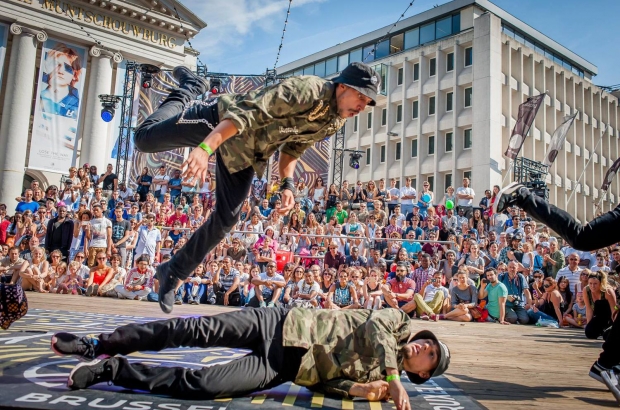- Daily & Weekly newsletters
- Buy & download The Bulletin
- Comment on our articles
Flanders (and Brussels) gets ready to party like it's 1302
What’s the connection between the Battle of the Golden Spurs in Kortrijk in 1302 and the Battle of the Dance taking place on Muntplein/Place de la Monnaie in Brussels? The answer is 11 July.
That was the date in 1302 when a huge battle took place on the the Groeningheveld outside Kortrijk. Lining up defiantly on one side was the impressive French army, consisting mainly of heavily armoured cavalry. Facing them were untrained and poorly armed Flemish infantry tradesmen. The result looked inevitable.
However, the Flemish had chosen their field of battle well; the Groeningheveld was a boggy field. The French horses sank in the mud, the heavy armour of the French knights became an impediment, and the Flemish peasants seized their opportunity. The battle became a rout.
Among the victors’ trophies were numerous golden spurs from the boots of the French knights, so it became known as the Battle of the Golden Spurs. Afterwards, Dutch became the official language of Flanders.
In the 19th century, the commemoration of the battle became a symbol of the struggle for Flemish recognition in the French-dominated Belgian State. In 1973, 11 July was declared the official Flemish Community Day.
Common future
Which brings us to 2016 and the Dance Battle on Muntplein. It’s just one of the events taking place as part of Brussels Danst, an event to commemorate Flemish Community Day in the capital. Young dancers will be seeking fame and prizes in front of an international panel of judges in a variety of categories. After the competition, you can join in and dance until late.
There are plenty of other ways to enjoy Flemish Community Day. You could join a tango dance gathering in the Mirror Hall of the Brussels Parliament or a guided historical pub crawl, setting off from the Grote Markt. And then you could return to Grote Markt for a concert by Flemish singer Bart Peeters with his mix of folk, world music, cabaret and jazz.
That’s only in Brussels. Throughout Flanders, municipal and city governments, local cultural councils, neighbourhood associations and residents’ groups are putting on hundreds of activities big and small. It’s the culmination of 11 days of celebrations called Vlaanderen Feest, or Flanders Celebrates. We asked chair An De Moor to explain the event’s significance.
Why is Vlaanderen Feest important?
By celebrating together, we create bonds and increase the sense of belonging, identity and community spirit among Flemings and everyone who lives in Flanders. As I always say in my 11 July speeches, it’s not the size of a culture that counts, but its cohesion, its togetherness, its awareness of a common identity. Our umbrella association, Flanders-Europe, is committed to promoting an open Flemish identity that combines international orientation and a positive interaction with other cultures.
How would you define “Flemish”?
I believe that being Flemish is determined not by ethnicity but by the choice of a common future. It’s illustrated by Abdul Nassaj, a young man born in Flanders in 1989 to Syrian parents. “Flanders is a part of me,” he told me recently. “I grew up here, and want to build my future here.”
Is 11 July growing in importance?
It’s still not what 4 July means for Americans, or Saint Patrick’s Day for the Irish. But the sense of belonging is growing every year, as is the number of neighbourhood parties, concerts and other events. I am particularly pleased to see the number of young people who take part in the festivities increasing every year.
Will it ever become an official bank holiday?
I hope so. At the moment only Flemish civil servants get a day off, but we hope that soon everyone living in Flanders will be able to enjoy a holiday on that day. To a non-Fleming who lives in Flanders, I would invite them to join the party. It’s a great opportunity to get to know a little more about the Flemish identity, culture and our language. You can choose from nearly 2,000 initiatives in almost all Flemish municipalities and cities.
Photo: Bouchra Draoui/Muntpunt









